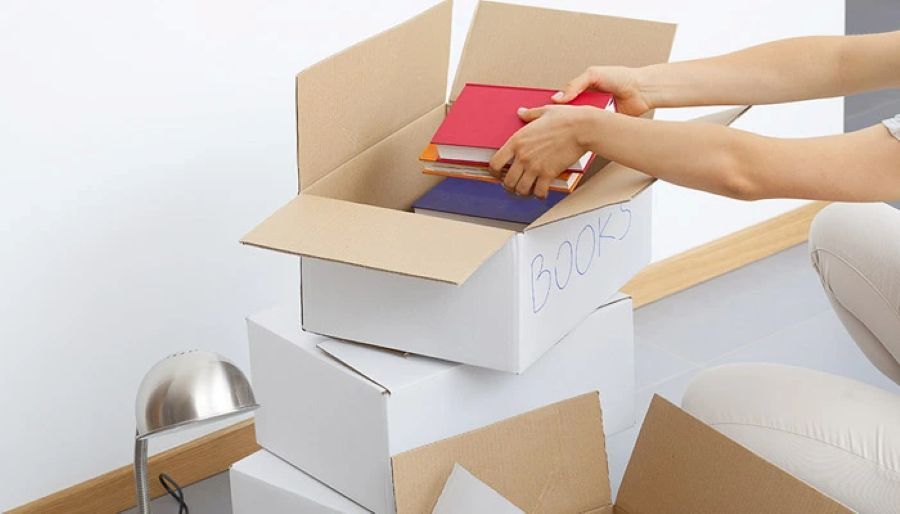How Long Before Moving out Should you Start Packing?
You should start packing 3-4 weeks before moving day. This gives you enough time to pack everything without stress while still having access to daily items you need.
Most people think they can pack everything in a few days. But the truth is, research shows that 24% of people are "panic packers" who wait until the last minute. Don't be one of them! Starting early makes your move so much easier and can help reduce the chronic stress that puts your health at risk, according to Mayo Clinic.
In this guide, you'll learn exactly when to start packing, what to pack first, and how to stay organized. We'll also share tips from professional movers to help you pack like a pro.
How Early Should You Start Packing for a Move?
The best time to start packing is 3-4 weeks before your moving date. Here's why this timeline works so well:
- You have time to sort through everything
- You won't feel rushed or stressed
- You can pack items you don't use daily first
- You'll have time to buy packing supplies
- You can declutter as you go
Different Home Sizes Need Different Timelines
Your home size affects how early you should start:
Studio or 1-Bedroom: 2-3 weeks is usually enough 2-Bedroom Home: 3-4 weeks gives you plenty of time 3+ Bedrooms: Start 4-6 weeks early, especially with kids
The average American moves 5 times in their lifetime, so getting this timeline right really matters! The U.S. Census Bureau tracks moving patterns and shows that millions of Americans relocate each year, making proper planning essential.
What Should You Pack First When Moving?
Start with items you rarely use. This is the golden rule of packing. Here's what to pack first:
Items to Pack 4+ Weeks Early
- Holiday decorations and seasonal items
- Out-of-season clothes
- Books you won't read soon
- Extra bedding and linens
- Collectibles and decorations
- Items in storage areas (attic, basement, garage)
Items to Pack 3 Weeks Early
- Guest room furniture and items
- Extra kitchen appliances you don't use daily
- Most of your clothes (keep one week's worth)
- Toys your kids don't play with often
- Office supplies and files
Items to Pack 2 Weeks Early
- Most kitchen items (keep basic cooking supplies)
- Bathroom items (keep daily toiletries)
- Living room decorations
- Extra furniture
Room-by-Room Packing Timeline
Start With These Rooms First
Basement and Attic: These areas have items you barely use. Perfect for early packing.
Guest Rooms: Since guests aren't staying right before you move, pack these rooms 3-4 weeks early.
Storage Areas: Closets, pantries, and cabinets often hold items you forgot about.
Pack These Rooms in the Middle
Living Room: Pack decorations and extra furniture 2-3 weeks before moving.
Bedrooms: Keep one set of sheets and a few days of clothes. Pack the rest 2 weeks early.
Home Office: Pack files and supplies early, but keep work essentials until the end.
Save These Rooms for Last
Kitchen: This is usually the hardest room to pack. Start 1-2 weeks before moving, but keep basic cooking items until the last few days.
Main Bathroom: Pack extra supplies early, but keep daily toiletries until moving day.
Master Bedroom: Keep essentials out until the last week.
What NOT to Pack Too Early
Some items should stay unpacked until the last few days:
- Daily medications
- Work clothes for the week
- Phone chargers
- Important documents
- Basic cooking supplies
- Cleaning supplies
- Toilet paper and toiletries
Smart Packing Timeline: Week by Week
4+ Weeks Before Moving
- Buy packing supplies
- Start decluttering
- Pack seasonal items
- Research moving companies
3 Weeks Before Moving
- Pack guest rooms
- Pack extra clothes and linens
- Pack books and decorations
- Confirm moving date
2 Weeks Before Moving
- Pack most kitchen items
- Pack living room items
- Pack non-essential bathroom items
- Start using up food in your fridge
1 Week Before Moving
- Pack most remaining items
- Keep only essentials unpacked
- Prepare a "first day" box
- Confirm details with movers
Moving Day
- Pack remaining toiletries
- Pack cleaning supplies
- Pack bed sheets from last night
- Do final walkthrough
How Many Boxes Will You Need?
Statistics show the average home needs about 60 boxes. But here's a better breakdown:
Studio/1-Bedroom: 15-25 boxes
2-Bedroom: 40-60 boxes
3-Bedroom: 60-80 boxes
4+ Bedrooms: 80+ boxes
Remember, these are just estimates. The average American has more stuff than they think!
Box Weight Guidelines
Keep boxes under 50 pounds so they're easy to carry. Here's what different box sizes should weigh:
- Small boxes: 30-35 pounds (perfect for books)
- Medium boxes: Around 30 pounds (clothes, linens)
- Large boxes: 30 pounds max (light, bulky items)
Packing Mistakes That Slow You Down
Starting Too Late
When you start packing just days before moving, you make poor decisions. You'll throw things in boxes without organizing them. This makes unpacking a nightmare.
Packing Daily Items Too Early
Don't pack your coffee maker if you use it every day! Keep daily essentials out until the last possible moment.
Not Labeling Boxes
Research shows that 46% of people go on "scavenger hunts" looking for items after moving. Label every box clearly!
Overpacking Boxes
Heavy boxes break and hurt your back. The weight limit for most moving boxes is 50 pounds.
Special Items That Need Extra Time
Fragile Items
China, artwork, and electronics need special packing. Give yourself extra time for these items. Consider professional packing services for valuable items.
Important Documents
Create a special folder for important papers:
- Birth certificates
- Insurance papers
- Medical records
- Moving contracts
Keep this folder with you during the move, not in the moving truck.
Hazardous Materials
Most movers won't transport paint, chemicals, or flammable items. You'll need to dispose of these safely or transport them yourself.
How Professional Movers Can Help
If packing feels overwhelming, professional movers can help. Full-service moving companies offer:
- Professional packing services
- Quality packing supplies
- Efficient packing methods
- Insurance for your items
Many people find that hiring professionals for fragile items while packing other things themselves works well.
Money-Saving Packing Tips
Declutter as You Pack
Moving costs are often based on weight. The less you move, the less you pay.
Use What You Have
Towels make great padding for fragile items. Clothes can fill empty spaces in boxes. This saves money on packing supplies.
Get Free Boxes
Ask local stores for free boxes. Liquor stores often have sturdy boxes perfect for moving.
Pack Yourself
Packing yourself saves money on moving costs. Professional packers charge extra, but you can learn to pack safely.
Making Your Timeline Work
Create a Packing Schedule
Write down what you'll pack each week. Having a plan keeps you on track. Harvard Business Review research shows that timeboxing and organized planning significantly improve productivity and reduce decision fatigue.
Get Help from Friends
Ask friends to help with packing parties. Make it fun with pizza and music!
Stay Flexible
Life happens. If you get behind schedule, focus on the most important items first.
Don't Aim for Perfect
Even an imperfect plan is better than no plan. Do your best and stay organized.
Signs You Started Packing at the Right Time
You know you started early enough when:
- You're not stressed about running out of time
- You have time to organize items properly
- You can declutter thoughtfully
- Friends can still help without it being an emergency
- You sleep well the night before moving day
What to Do If You're Behind Schedule
If moving day is coming fast and you're not ready:
Focus on Essentials First
Pack a suitcase with clothes and toiletries for several days. This gives you breathing room.
Get Extra Help
Ask friends and family for help. Consider hiring professional packers for last-minute assistance.
Use the One-Day Packing Method
If you must pack in one day:
- Give each helper one room
- Use trash bags for clothes
- Don't worry about perfect organization
- Label boxes clearly as you go
Moving Day Essentials Box
Pack a special box with items you'll need right away:
- Toilet paper
- Basic tools
- Phone chargers
- Snacks and water
- First-aid kit
- Cleaning supplies
- Change of clothes
- Important documents
Keep this box with you, not on the moving truck.
Final Thoughts
Starting to pack 3-4 weeks before moving day is the sweet spot for most people. It gives you time to be organized without feeling rushed. Remember, 58% of successful movers believe having a timeline is important.
The key is starting with items you don't use daily and working your way to essential items. Take time to declutter as you pack - it saves money and makes your new home feel fresh.
Moving doesn't have to be stressful. With the right timeline and a good plan, you'll be settled in your new home before you know it. Research from the American Psychological Association emphasizes the importance of planning and organization in reducing stress during major life changes. If you need help with your move in the Edmonton area, Last Stop Moving is here to make your move smooth and stress-free.



